- Home
- Brandon Sanderson
Snapshot Page 5
Snapshot Read online
Page 5
“We should talk in private,” Davis said to the narco.
“Why?” he demanded.
“Because you won’t want what we tell you to spread,” Davis said, meeting his eyes, trying to project a confidence he didn’t feel.
The narco weighed him. An autocab passed on the street behind them with a quiet hum. Finally the narco nodded, and led the two of them farther into the alley. The rest of the gang members stayed put, one sighting on Davis with his own gun, as if in warning.
“You scared Pepe really well,” the narco said. “He thinks you’re feds. It was a cute trick, palming a hit of stiff in front of him. Tell me why I shouldn’t just have you shot.”
“If we were feds,” Chaz noted, “you think that offing us would somehow be a good idea?”
Davis calmly reached to his pocket and took out his wallet, then opened it, revealing his reality badge.
The narco’s eyes caught on it. They widened, mesmerized, almost like he had taken a hit of some drug. He whispered a soft prayer, then reached out with reverent fingers, touching the badge.
“You . . .” The narco swallowed. “You said you weren’t cops.”
“I never said that,” Davis said, not putting the badge away. “I said we were willing to pay for some information. About the person renting a specific apartment building from you.”
“You’ve gotten yourself into something bad, friend,” Chaz said. He pulled out a cigarette and put it in his mouth, but didn’t light it. He’d been trying to stop. “This guy who has been paying you? He’s been murdering people. Prostitutes. Children. Anyone he can find who won’t make waves.”
The narco cursed softly.
Davis raised his phone, set to display his entire savings. A number larger than most cops would have been able to save. But he didn’t have many expenses—just child support, really. He slept in a saferoom provided by the precinct, on the outskirts of the city, so he was less likely to run into himself while in a Snapshot.
“Tell us about this guy renting the apartment building,” Davis said. “You knew there was something off about him, didn’t you? Wipe that conscience clean, and you can take every penny of this. My payment to you.”
“It’s fake, isn’t it?” the narco said, running his hand across his buzzed scalp. He swore something fierce. “It’s all fake.”
“Sure, sure,” Davis said. “Completely fake. But you’re the only one who knows it, friend.”
“Take the money,” Chaz suggested, leaning one shoulder against the wall. “Live it up for a day. They’ll turn this Snapshot off sometime in the evening. You’re going to vanish then. Might as well enjoy the time you have left.”
Davis dangled the phone. The narco looked at it, then sank down beside the wall of the alleyway.
And started crying.
Chaz rolled his eyes. Davis looked at the street thug and felt a wrenching inside of him. Something about the Snapshot really must have made dupes realize they weren’t real, once they saw the badge. The bean counters outside denied it, but they didn’t live in here. Didn’t see men like this, hardened criminals, crack and turn into children before the inevitable truth that their entire world was doomed.
Davis sank down and sat next to the man. He waved for Chaz to hand him the pack of cigarettes, then offered one to the narco.
“Mama always said those would kill me,” the man said, then laughed. Davis figured he’d been wrong about the narco’s age. He wasn’t in his thirties; he just looked older compared to the others.
The narco took a cigarette. Davis lit it up, then lit one for himself.
“I feel like the reaper sometimes,” Davis said. “You know. Showing up, informing people that they’re going to die in a few hours?”
The narco breathed in smoke, then exhaled it. He rested his head back against the wall, tears still streaming down his cheeks.
“What’s your name?” Davis asked.
“Does it matter?”
“I’m real, kid,” Davis said. “I’ll remember your name.”
“Horace,” the kid said. “Name’s Horace.”
“Horace. You don’t want the money, do you?”
Horace shook his head. “Won’t make me forget, ese.”
“Go home then. Hug your mom. But before you go, do some good. Tell me about this guy who has been renting that building from you.”
“What does it matter?”
“He’s killing kids,” Davis said. “Sure, your life is over. That’s tough. But hell, why not help us stop this monster before you go?”
Chaz shook his head, arms folded. In the mouth of the alleyway, the other kids were whispering, looking panicked by the narco’s actions.
“He’s young,” Horace whispered. “Maybe my age. Twenty-four, twenty-five. Asian. Quiet type. Creepy. We stay out of his business—figured he killed someone and wanted to hole up. But didn’t think . . . you know . . .” He shuddered. “He won’t come back. One of the kids spotted him running. Your people at his hidey-hole spooked him. He’s gone.”
“You have a name?” Davis asked. “Anything?”
“No name,” Horace said, then took a puff of the cigarette. “You got some paper I can write on?”
Davis fished in his pocket and came out with a small piece of paper. The gangster took a pen from his pocket and wrote on it. An address.
“He wanted two places,” he said softly. “With large tubs or pools in them he could fill. That’s the second. A school, once. If he’s smart, he’ll run and you’ll never see him. But people like him, they can be really smart in some ways but . . .”
“Really dumb in others,” Davis said with a nod. “Thanks.”
Horace shrugged, puffing on the cigarette. “You’re right. I knew something was wrong about him. Watch out for yourself, ese. He’s . . . well, I figured he was just crazy. But he knows.”
“Knows?” Davis said, glancing at Chaz.
“That it isn’t real,” Horace said. “He kept saying it. This is a Snapshot; we’re all part of a Snapshot. Got to get rid of the Deviations, he said. Warned me. Don’t be a Deviation. . . .”
Davis felt a chill.
“Anyway,” Horace said, “give me that cash.” He held out his phone.
“You said you didn’t want it.”
“I don’t.” He pointed down the alleyway. “Those boys though, they’re gonna get a bonus today. Spend a few hours in luxury. Don’t tell them, okay?”
“I wouldn’t dream of it,” Davis said, tapping Horace’s phone with his, transferring enough to buy a nice car.
Horace stood and stamped out the cigarette, leaving a little twist of smoke on the ground at Davis’s feet as he walked down the alleyway. He adopted a stronger gait before he reached the kids. A practiced air of invincibility.
“Leave the guns!” Davis called to them, suddenly panicked by the thought of them running off with the weapons.
They dropped them in the mouth of the alleyway, then were gone.
“I can’t believe that worked,” Chaz said, arms folded. He looked at Davis. “How did you get him to talk like that?”
“He was scared,” Davis said, forcing himself to his feet. “Guess I played off that.”
“We never do stuff like this anymore,” Chaz said. “Interview suspects. We can get them to talk when they never would IRL. We’re really wasted in here, aren’t we?”
“Maybe. Maybe not.” Most of the testimony they could gather in here was inadmissible in court—if they found a witness, the IRL cops would have to get them to testify for real. And of course, a dupe’s words couldn’t be used against the real person in court.
It was all so sticky. Most cases involving Snapshots were arduous things, full of testimony on Deviations, possibilities, and technical arguments. The only thing that really held up was the testimony of the cops. They had to have good enough records to be viable witnesses, but also had to be officers the precinct wouldn’t care about wasting in work that nobody else wanted to do.
; The two of them collected their guns. “I didn’t realize you’d started carrying,” Chaz noted to him. “Least not until I saw that gun earlier.”
“I’ve been doing it for a few months now,” Davis said. The truth, as he’d wanted to get back in the habit. Though this was a new gun, his first time carrying it into a Snapshot.
He looked after the gang members, but couldn’t spot them. They’d run off fast.
“Good thing this isn’t real,” Chaz said, shading his eyes from the late afternoon sun. “You’d be broke, friend. I had no idea you’d saved up such a nest egg. How’d you manage to do that?”
“Simple tastes,” Davis said. And plans to buy a house someday. Him, his son, his wife . . .
Well, that was one dream that could die. “Come on,” he said. “Let’s check this second place out, though I’m worried. We’ve been racking up quite the list of Deviations. Try not to step on any butterflies on the way.”
Chaz gave him a confused look, and Davis just shook his head, calling them another autocab.
Six
Davis and Chaz stopped on the cracked sidewalk in front of a boxy monster of a building. It loomed, hollow, with windows too small to be comfortable. Like a prison. Which was, as Davis considered it, a very accurate comparison.
“Southeast High School,” Chaz read from the sign—full of bullet holes—to their right.
“Closed two years ago,” Davis said, reading from his phone.
“They were using that box up until two years ago?” Chaz said. “Damn. No wonder kids out here turn to selling drugs.”
The school’s front doors were wrapped in chains to keep them closed. Davis took a deep breath, and glanced at Chaz. Both took out their sidearms.
You could get killed inside a Snapshot, though it didn’t happen as often as it did to cops IRL. You could anticipate your surroundings in the Snapshot, barring Deviations. You knew which thugs were likely to start shooting, and which situations were more dangerous.
Still, it happened. Most often it was something mundane. The woman Davis had replaced had died in a simple car accident. She’d insisted on driving a squad car instead of taking autocabs. She could just as easily have died on her way home from work, but she’d crashed here in the Snapshot.
It felt somehow wrong to think of a cop dying in the Snapshot. This place wasn’t truly real. It shouldn’t, therefore, have such real consequences. As Chaz always said, things you did in the Snapshot didn’t really matter. . . .
“Locked tight,” Chaz said, testing the chains on the front doors. Perhaps the killer had a key, but Davis suspected not. The front entrance was far too prominent; you couldn’t sneak in bodies this way, even at night, without risking someone seeing you. So where?
He led the way across dead grass that hadn’t been watered in years, sliding around the school to some kind of shipping entrance at the back, up a short ramp. Yeah, this was better. You could pull a car in here silently and unload.
He tried the door at the top of the ramp, and found it unlocked. He nodded to Chaz and both stepped inside, handguns pointed into the shadows.
“That’s a nice gun,” Chaz noted softly. “Taurus PT-92, right? Flashy. Pearl grip, even. Not what I’d have expected for you.”
Davis didn’t reply. Heart beating quickly, finger deliberately not on the trigger, he led the way through the echoing halls of the school. The debris here was somehow more personal than that back at the apartment building. Old discarded notebooks. Pencils with the tips broken off. A ball cap, a deflated soccer ball. This had been a lively place up until a few years ago.
That only made it feel creepier now. Haunted. Unlike the apartment building, which had been gutted, this place had been abandoned in haste. Nobody had wanted to be here—not students, administrators, or teachers.
They passed an old trophy case, the glass shattered, dust covering the plaques. Graffiti tags covered the walls. By now it was almost 16:00, and the sunlight sneaked into the place through boarded windows, reflecting off old tile floors and casting shadows. But it was enough for Davis to make out a sign on the wall without needing his flashlight. He waved his gun toward it, then pointed. Looked like the school had its own pool. An indoor one, near the gym.
Davis found himself sweating as they crept along the corridor. He jumped as a feral cat scurried out of one hall and down another one, into darkness. He was so startled, he nearly unloaded his gun at the thing.
You’re going to have to confront this, he thought, heart racing as they moved inevitably forward. It had been years since he’d been in a position like this, but the memories came back, sharp like broken glass. A dark building. Calls for backup, and . . .
And Davis, useless.
Is this why you insisted on watching for cases like this? So you could prove to yourself you could do it? That you could pull the trigger?
He still let Chaz go first when they reached the pool. He stood outside the door—breathing hard, wiping his brow with a trembling hand—before finally forcing himself in through the door behind his partner. He’d waited too long, he knew. If there had been danger inside, Chaz would have been in trouble, alone.
There was no danger. There wasn’t anything. They needed the flashlights again, but the pool was empty—not even any water. Air feels humid, Davis thought, forcing his breathing back under control.
“Huh,” Chaz said, hands on hips. “Were we wrong?”
Davis waited until his trembling subsided, though he couldn’t completely banish his tension—the pressure on his chest that made him feel like running away as fast as he could go. He pointed his light toward the locker rooms, then started that way. He peeked inside and found a table had been pulled in there, set with some cups and fast-food wrappers. Seemed newer than the rest of the school’s debris.
“Careful,” Davis said. “Someone has been here.” He stopped in the doorway into the locker rooms until Chaz nudged him from behind; then he forced himself farther in, gun in one hand, flashlight in the other.
There was a place for demeaning group showers, and here someone had worked with a board and some caulk to turn it into a kind of tub. Yeah, this was the killer’s hideout. He was preparing to soak some more bodies. The improvised tub was full of water, maybe four feet high, but there weren’t any bodies in it yet. Perhaps the Photographer was seeing if his handiwork would hold.
We might be in time, then! Davis thought. He might not have killed the next group.
He immediately felt stupid. This was a Snapshot of life from ten days ago. Still, surely they could do some good, help catch the one doing this.
“Hey,” Chaz said. “Check this.”
Davis turned away from the showers, to where Chaz was shining his phone’s light on a door that was shut tight, with a chair wedged under it and some rope tying the knob to a post beside the wall.
Davis hastened over, his tension rising again. That looked like an improvised lock to keep someone in. He nodded, and Chaz unwedged the door, then untied the rope. No sounds came from within. They shared a look, and then Davis let Chaz ease open the door, gun pointed downward so as to not accidently shoot any captives. It smelled foul inside, and Davis gagged.
“Bodies,” Chaz said with a grunt, using his phone for light. “Damn, it smells terrible in here.” He stepped forward.
His shoe crunched.
Chaz jumped backward, then the two leaned down. The floor in here was littered with insect carcasses.
Bees, Davis thought as Chaz opened the door farther. His flashlight highlighted the slumped corpses of people on the floor, surrounded by dead insects. The stench was overwhelming, and Davis had to breathe through his mouth.
Why bees? Davis thought as he inched into the room, brushing the insect carcasses from in front of him. There were hundreds, maybe thousands, of dead bees in here.
It started to make sense. His tension melted away before the academic facts, and he stood up in the dark room. It had been a storage room for old sports equipment. There w
ere six people inside, all dead now.
“Check the corpses,” he told Chaz. “See if they share anything obvious. Age, gender.” He barely noticed whether Chaz went to do it. Instead, he tucked away his gun and called up autopsy reports from the earlier murders.
He kept saying it. Horace the drug dealer’s voice echoed in his memory. This is a Snapshot; we’re all part of a Snapshot. Got to get rid of the Deviations, he said.
Don’t be a Deviation.
The first group had died by asphyxiation. The cops assumed they’d been suffocated in the bags, but that didn’t fit the pattern. They’d have been killed before being placed in the bags, right? The killer would have wanted to soak them first, to obscure how long they’d been in the ocean.
“Man,” Chaz said. “These people look bad, Davis. Even for dead folk. I think I might need to throw up.”
“Do it outside the room,” Davis said absently.
There, he thought, pulling up the records of one of the bodies they’d identified. A prostitute. He scanned her medical records. Asthma. It was a connection. One of the others listed the same ailment. The others didn’t list much, but they also didn’t have any notes from next of kin. So maybe the information just hadn’t been discovered.
The second group had died from poisoning. What was the theme? He scanned through the reports and happened across one note by an examiner. All victims were extremely farsighted and wore corrective lenses.
The third group—the bodies they’d found in the basement of the old apartment complex—clinched it for him. The officers there had left to find out why everyone was panicking back at the precinct office, but before abandoning their investigation they’d left a very important note.
These people all seem to have been naturally paralyzed.

 Steelheart
Steelheart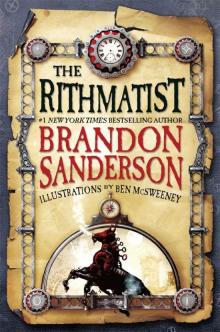 The Rithmatist
The Rithmatist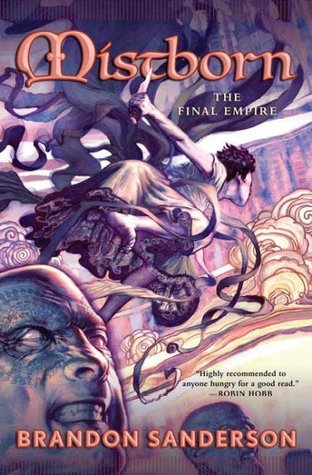 Mistborn: The Final Empire
Mistborn: The Final Empire Oathbringer
Oathbringer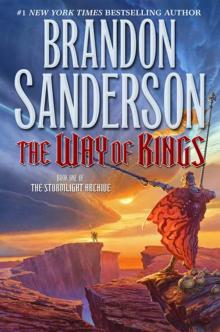 The Way of Kings
The Way of Kings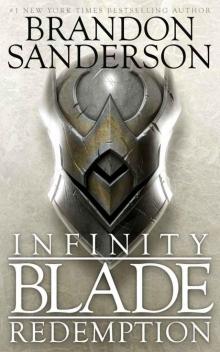 Redemption
Redemption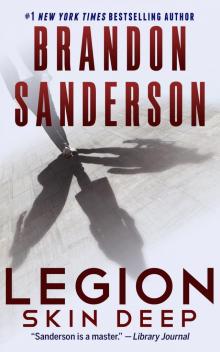 Skin Deep
Skin Deep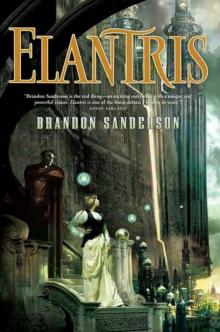 Elantris
Elantris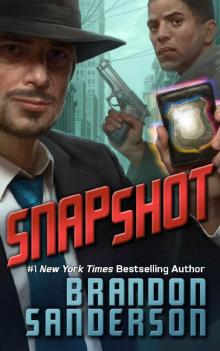 Snapshot
Snapshot Sixth of the Dusk (Cosmere)
Sixth of the Dusk (Cosmere)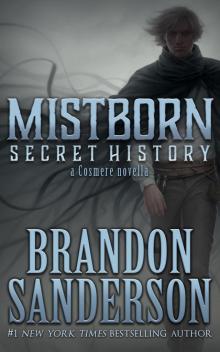 Mistborn: Secret History
Mistborn: Secret History White Sand, Volume 1
White Sand, Volume 1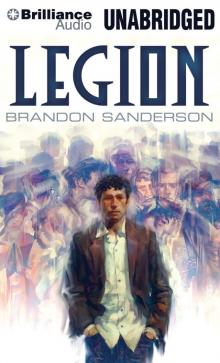 Legion
Legion The Well of Ascension
The Well of Ascension The Bands of Mourning
The Bands of Mourning Words of Radiance
Words of Radiance The Hero of Ages
The Hero of Ages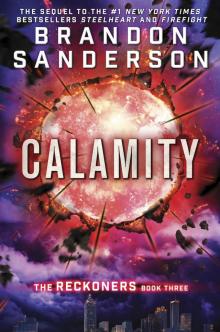 Calamity
Calamity Alcatraz Versus the Scrivener's Bones
Alcatraz Versus the Scrivener's Bones The Alloy of Law
The Alloy of Law The Emperors Soul
The Emperors Soul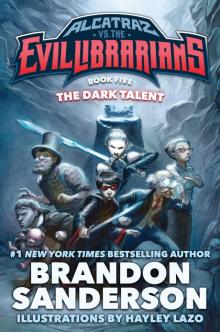 The Dark Talent
The Dark Talent The Gathering Storm
The Gathering Storm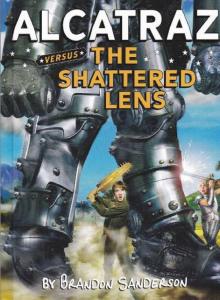 Alcatraz Versus the Shattered Lens
Alcatraz Versus the Shattered Lens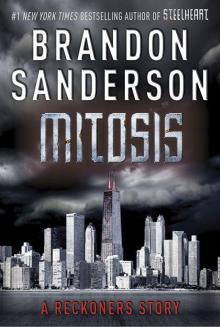 Mitosis
Mitosis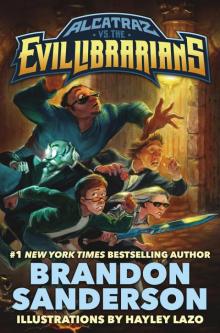 Alcatraz vs. The Evil Librarians
Alcatraz vs. The Evil Librarians Rhythm of War (9781429952040)
Rhythm of War (9781429952040)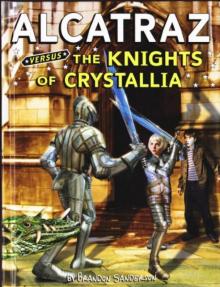 Alcatraz Versus the Knights of Crystallia
Alcatraz Versus the Knights of Crystallia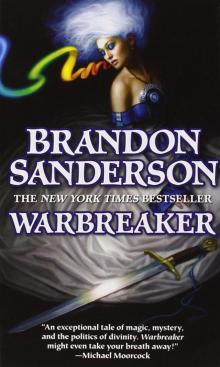 Warbreaker
Warbreaker Firstborn
Firstborn Starsight
Starsight Edgedancer
Edgedancer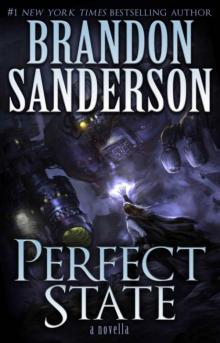 Perfect State
Perfect State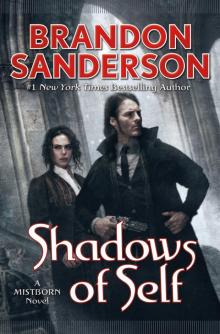 Shadows of Self
Shadows of Self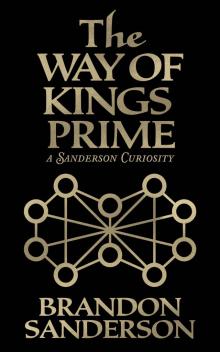 The Way of Kings Prime
The Way of Kings Prime Starsight (US)
Starsight (US) Shadows for Silence in the Forests of Hell
Shadows for Silence in the Forests of Hell Arcanum Unbounded: The Cosmere Collection
Arcanum Unbounded: The Cosmere Collection Awakening
Awakening Firefight
Firefight Dawnshard
Dawnshard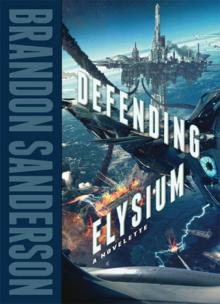 Defending Elysium
Defending Elysium White Sand
White Sand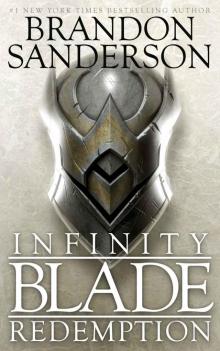 Infinity Blade: Redemption
Infinity Blade: Redemption The Final Empire
The Final Empire Skyward
Skyward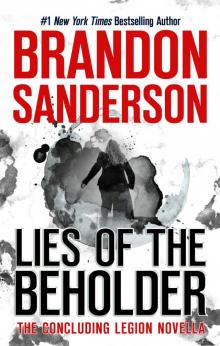 Lies of the Beholder
Lies of the Beholder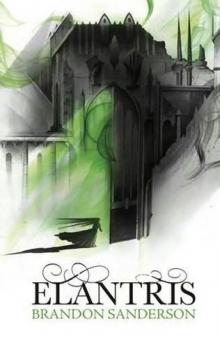 Elantris e-1
Elantris e-1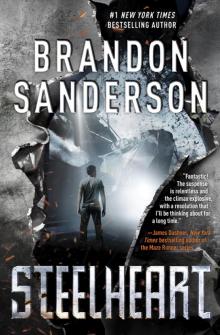 Steelheart r-1
Steelheart r-1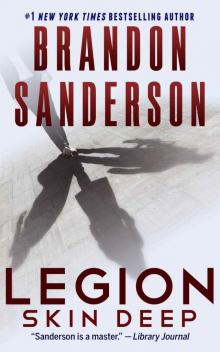 Legion: Skin Deep
Legion: Skin Deep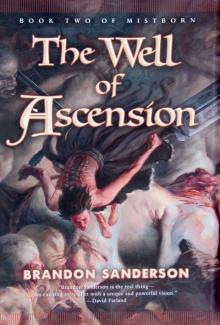 Well of Ascension
Well of Ascension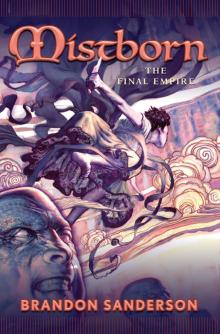 Mistborn
Mistborn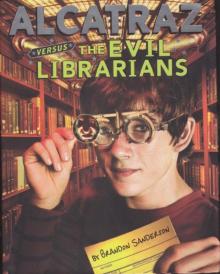 Alcatraz versus the Evil Librarians
Alcatraz versus the Evil Librarians The Final Empire m-1
The Final Empire m-1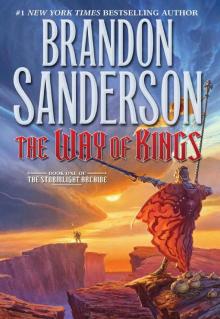 The Way of Kings (Stormlight Archive, The)
The Way of Kings (Stormlight Archive, The)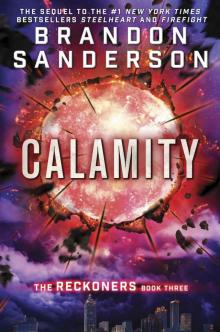 Calamity (The Reckoners)
Calamity (The Reckoners) Legion and the Emperor's Soul
Legion and the Emperor's Soul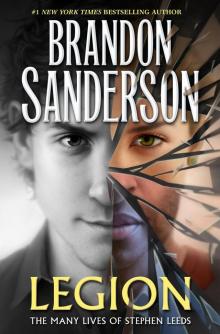 Legion: The Many Lives of Stephen Leeds
Legion: The Many Lives of Stephen Leeds The Mistborn Trilogy
The Mistborn Trilogy Bands of Mourning
Bands of Mourning Alcatraz
Alcatraz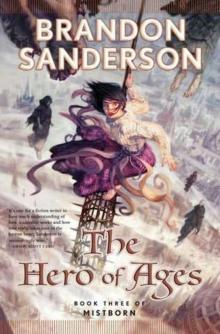 The Hero of Ages m-3
The Hero of Ages m-3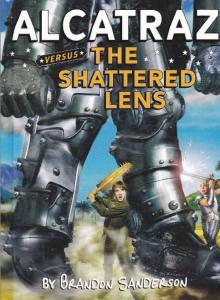 Alcatraz vs. the Shattered Lens
Alcatraz vs. the Shattered Lens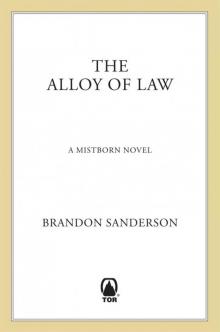 The Alloy of Law: A Mistborn Novel
The Alloy of Law: A Mistborn Novel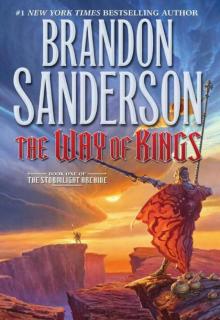 The Way of Kings sa-1
The Way of Kings sa-1 Infinity Blade: Awakening
Infinity Blade: Awakening Sixth of the Dusk
Sixth of the Dusk The Stormlight Archive
The Stormlight Archive The Aether of Night
The Aether of Night